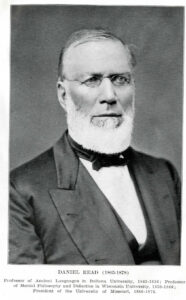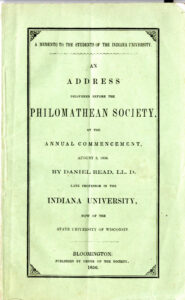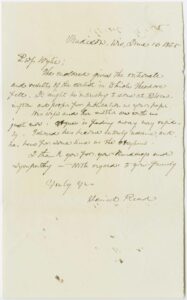Do you often wonder about the name behind a building? Most buildings on campus are named for someone, but most people probably do not know who those mysterious persons are. Some of them may have been more recent donors or some, such as Daniel Read, may be figures from the early years of the University.

Daniel Read, for whom Read Hall is named, was born in Ohio in 1805. He attended Ohio University, from which he graduated in 1824. He went on to receive a Master of Arts degree in 1827 and then an honorary LL.D. in the 1850s from Indiana Asbury University (which is now DePauw University). He was technically a lawyer, but he never practiced. During the 1830s, he returned to his alma mater to be a professor of classics (or ancient languages, depending on the source) and eventually vice-president. He was also a visitor at the military academy at West Point.
Eventually, however, Read made his way to Indiana University. There he taught ancient languages from 1843 to 1856, a faculty member during the same time as Robert Milligan. While there, Read made an important contribution to the University, in effect, saving it. In 1850, Read attended a state constitutional convention. The University was in danger of losing its land—granted by the government. Read ensured that the funds designated for the University (the land) would stay with the University. Read had, in fact, saved the University. A few years later, in 1854, he and another professor would travel to Washington, D.C., to successfully petition for land from the federal government. Although not at Indiana University very long—only thirteen years—Read made an impact on the University.

After leaving Indiana University, Read went on to teach at the University of Wisconsin, where he was a professor of Mental and Moral Philosophy, and then to become the president of the University of Missouri, from 1866 to 1876. Read had an impact at the University of Missouri as well. He worked to widen the educational opportunities at that university in the form of a normal school and an agricultural and mechanics school. Another important contribution was once again in the form of greatly helping the university as a whole. Read worked to push the General Assembly of the state to recognize the university. Read also felt strongly about women attending universities, working towards admitting women to the University of Missouri. When he had been at Indiana and had attended the state constitutional convention, he had also been a supporter of women’s rights.

While Read had a great impact on the universities where he worked, his family also had an impact on the world. His sister, Mrs. McPherson, was the head of the Female Seminary. Another famous relation was his great-great-nephew, John Foster Dulles. Sadly, his own immediate family was marked with tragedy. Read, with his wife Alice, had two children, Theodore and Agnes, whose lives ended when they were young adults. Theodore fought in the Civil War, rising to the rank of Brigadier General and surviving most of the war. However, in a tragic stroke of fate, he was killed at Appomattox. Read wrote a moving letter in which he describes how Theodore’s death affected the family:
“[He] proposed in his very last letter to have one of his sisters, after things became regulated, visit him. But it is all over. My family is bereft of him to whom we all looked as our ornament, comfort and support. I can only cry out, O Theodore, my son Theodore. How terrible that this calamity should have come after he seemed to be safe. In my own thoughts and my congratulations with friends I had just said – Well, thank God, it is over and Theodore is living. Just then a dispatch from Major Seward was put in my hands in these words – ‘Brig. Gen. Read was killed on Tuesday 9th heading the most gallant fight of the war’ He was mistaken, I think, as to day, but oh, such glory – Moving glory that takes away all the hopes and comfort of parents, wife, sisters.”
Only the next year, in 1866, Agnes died, having been in poor health for a while. Read himself died in 1878.
Daniel Read, perhaps now lost in obscurity simply as the namesake of a hall, should be remembered as the professor who fought for the rights of women and fought to save universities, one of them being our own Indiana University.
Leave a Reply